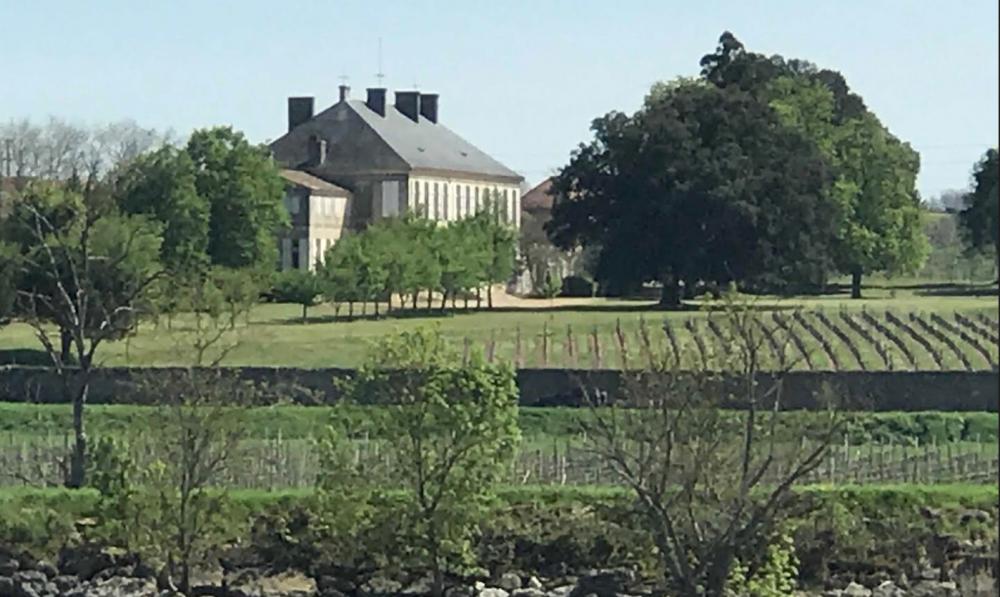But someone has to do it, so the cliche goes concerning a totally pleasant experience that seems almost surreal. So, ten days in Bordeaux and its surrounding vineyard-stocked countryside was truly wonderful and enriching. Relaxing, too.
For eight days, my wife and I were happy, passive passengers on a Viking long ship as it cruised the Garonne, Gironde and Dordogne rivers in southwest France, with numerous excursions led by experienced and knowledgeable guides. If wine were not the main subject, then food dominated the dialogue.

Street scene in Bordeaux
We spent two extra days in Bordeaux after the cruise with our 17-year-old grandson, who has been spending a high school year abroad in Toulouse. He kindly took a train from his adopted city to enable us to see Bordeaux through the eyes and reactions of a young man who has been immersed in French culture for eight months. We also appreciated his command of the language. Dealing with merchants and waiters was much easier due to our grandson.
The 185 passengers on the Viking Forseti included people from the United States, Great Britain, Canada, New Zealand, and Mexicans. Our fellow Americans hailed from Iowa, Arizona, California, Oregon, Washington state, Minnesota, Oklahoma and New York State, among other states. We met no other Marylanders.
This was our second Viking journey. Many others also were repeat customers.

Food market in Bordeaux
As noted, wine and food underscored the major focus of this trip. I do not drink the former but enjoy the latter. At one point, in the village of St. Emilion, surrounded by lush fields of vineyards, the guide said that wine was religion in that area. St. Emilion even had its own saint of wine. It may seem far-fetched to this Diet Coke-devotee—but not so much when you realize that the growing of grapes and the production drive the economy in the Bordeaux region and burnish its well-cultivated worldwide reputation.
>According to the ship’s program director, 23 bottles of Bordeaux wine are sold every second in this world. That’s impressive.
We learned that during World War II, the Nazis, who occupied France, enjoyed the wine, shipping barrels back to Germany. The French Resistance, intent on protecting its culture and beloved wine, often served the dregs to the rapacious Germans. And, so the story goes, French resistance fighters would board trains to German and spill the barrels of wine.
The Germans could occupy France but not destroy the wine—without paying a price for their greed.
As we traveled the wide rivers, we were struck by its muddiness and lack of boat and ship traffic. The Gironde, an estuary, leads to the Atlantic Ocean. Countervailing wave action, interacting with the soft soil, apparently create the muddy appearance. I could not find an answer to the solitude of the rivers—so very different from our Eastern Shore waterways, including the estuary that is the Chesapeake Bay.
Speaking of soil, I learned that wine-growing grapes depend on the soil, rain, sun, temperatures, strong and deep roots—and no fertilizer. I learned that the best wines emanate from vines that are at least 10-years-old, if not more. Laborers comprise Spaniards, Portuguese and students. Vineyards and wine production have been in the hands of some families for hundreds of years. In one area, pebbles are part of the “terroir” (soil and climate), producing heat for the vines at night.

Water mirror park along the Bordeaux riverfront
Bordeaux is a port city. In recent years, it has experienced a surge of development, spurred by a revival of the waterfront, marked by parks and constant activity. A speedy train now can reach Paris in two hours; hence, commuter travel has increased considerably. It also has hiked property values spurred by relocated Parisians, a reality scorned, we were told, by Bordelaise.
Pedestrian shopping areas in Bordeaux contribute to the vibrancy of the city. These urban spaces, mostly untouched by cars, create a livable and pleasant way to shop and congregate. Really refreshing.
Traveling under the hospitable and friendly umbrella of Viking River Cruises is an unbeatable experience for us. Only 190 passengers fill the long ship. Food and service are superb. Intense training in customer service is obvious. This is not a promotional flack piece for Viking—just testimony from a very satisfied customer.
One last but important point: the weather was warm and comfortable. We had to travel to France to find 80-degree weather. My gosh did it feel different than home.
We’re glad we traveled to southwest France. We’re very happy to be home. Back to life on our own.
Columnist Howard Freedlander retired in 2011 as Deputy State Treasurer of the State of Maryland. Previously, he was the executive officer of the Maryland National Guard. He also served as community editor for Chesapeake Publishing, lastly at the Queen Anne’s Record-Observer. In retirement, Howard serves on the boards of several non-profits on the Eastern Shore, Annapolis and Philadelphia.



Kristen Greenaway says
A ta santé, Howard!
Jon Powers says
Dear Mr. Freedlander,
A wonderful story as only you could have written. However at the end of paragraph nine you refer to the Chesapeake Bay. We all know from the Baltimore Sun style book it is Chesapeake Bay without the the.
Did you bring home any samples from the trip?